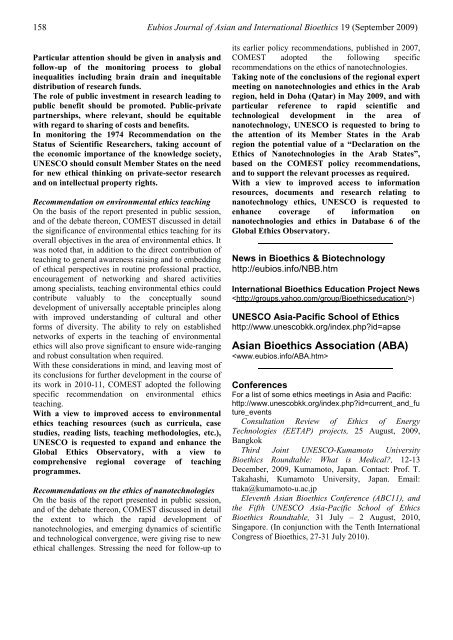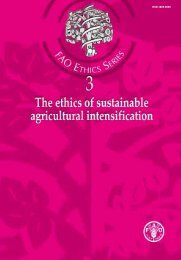Eubios Journal of Asian and International Bioethics EJAIB
Eubios Journal of Asian and International Bioethics EJAIB
Eubios Journal of Asian and International Bioethics EJAIB
Create successful ePaper yourself
Turn your PDF publications into a flip-book with our unique Google optimized e-Paper software.
158 <strong>Eubios</strong> <strong>Journal</strong> <strong>of</strong> <strong>Asian</strong> <strong>and</strong> <strong>International</strong> <strong>Bioethics</strong> 19 (September 2009)<br />
Particular attention should be given in analysis <strong>and</strong><br />
follow-up <strong>of</strong> the monitoring process to global<br />
inequalities including brain drain <strong>and</strong> inequitable<br />
distribution <strong>of</strong> research funds.<br />
The role <strong>of</strong> public investment in research leading to<br />
public benefit should be promoted. Public-private<br />
partnerships, where relevant, should be equitable<br />
with regard to sharing <strong>of</strong> costs <strong>and</strong> benefits.<br />
In monitoring the 1974 Recommendation on the<br />
Status <strong>of</strong> Scientific Researchers, taking account <strong>of</strong><br />
the economic importance <strong>of</strong> the knowledge society,<br />
UNESCO should consult Member States on the need<br />
for new ethical thinking on private-sector research<br />
<strong>and</strong> on intellectual property rights.<br />
Recommendation on environmental ethics teaching<br />
On the basis <strong>of</strong> the report presented in public session,<br />
<strong>and</strong> <strong>of</strong> the debate thereon, COMEST discussed in detail<br />
the significance <strong>of</strong> environmental ethics teaching for its<br />
overall objectives in the area <strong>of</strong> environmental ethics. It<br />
was noted that, in addition to the direct contribution <strong>of</strong><br />
teaching to general awareness raising <strong>and</strong> to embedding<br />
<strong>of</strong> ethical perspectives in routine pr<strong>of</strong>essional practice,<br />
encouragement <strong>of</strong> networking <strong>and</strong> shared activities<br />
among specialists, teaching environmental ethics could<br />
contribute valuably to the conceptually sound<br />
development <strong>of</strong> universally acceptable principles along<br />
with improved underst<strong>and</strong>ing <strong>of</strong> cultural <strong>and</strong> other<br />
forms <strong>of</strong> diversity. The ability to rely on established<br />
networks <strong>of</strong> experts in the teaching <strong>of</strong> environmental<br />
ethics will also prove significant to ensure wide-ranging<br />
<strong>and</strong> robust consultation when required.<br />
With these considerations in mind, <strong>and</strong> leaving most <strong>of</strong><br />
its conclusions for further development in the course <strong>of</strong><br />
its work in 2010-11, COMEST adopted the following<br />
specific recommendation on environmental ethics<br />
teaching.<br />
With a view to improved access to environmental<br />
ethics teaching resources (such as curricula, case<br />
studies, reading lists, teaching methodologies, etc.),<br />
UNESCO is requested to exp<strong>and</strong> <strong>and</strong> enhance the<br />
Global Ethics Observatory, with a view to<br />
comprehensive regional coverage <strong>of</strong> teaching<br />
programmes.<br />
Recommendations on the ethics <strong>of</strong> nanotechnologies<br />
On the basis <strong>of</strong> the report presented in public session,<br />
<strong>and</strong> <strong>of</strong> the debate thereon, COMEST discussed in detail<br />
the extent to which the rapid development <strong>of</strong><br />
nanotechnologies, <strong>and</strong> emerging dynamics <strong>of</strong> scientific<br />
<strong>and</strong> technological convergence, were giving rise to new<br />
ethical challenges. Stressing the need for follow-up to<br />
its earlier policy recommendations, published in 2007,<br />
COMEST adopted the following specific<br />
recommendations on the ethics <strong>of</strong> nanotechnologies.<br />
Taking note <strong>of</strong> the conclusions <strong>of</strong> the regional expert<br />
meeting on nanotechnologies <strong>and</strong> ethics in the Arab<br />
region, held in Doha (Qatar) in May 2009, <strong>and</strong> with<br />
particular reference to rapid scientific <strong>and</strong><br />
technological development in the area <strong>of</strong><br />
nanotechnology, UNESCO is requested to bring to<br />
the attention <strong>of</strong> its Member States in the Arab<br />
region the potential value <strong>of</strong> a “Declaration on the<br />
Ethics <strong>of</strong> Nanotechnologies in the Arab States”,<br />
based on the COMEST policy recommendations,<br />
<strong>and</strong> to support the relevant processes as required.<br />
With a view to improved access to information<br />
resources, documents <strong>and</strong> research relating to<br />
nanotechnology ethics, UNESCO is requested to<br />
enhance coverage <strong>of</strong> information on<br />
nanotechnologies <strong>and</strong> ethics in Database 6 <strong>of</strong> the<br />
Global Ethics Observatory.<br />
News in <strong>Bioethics</strong> & Biotechnology<br />
http://eubios.info/NBB.htm<br />
<strong>International</strong> <strong>Bioethics</strong> Education Project News<br />
)<br />
UNESCO Asia-Pacific School <strong>of</strong> Ethics<br />
http://www.unescobkk.org/index.phpid=apse<br />
<strong>Asian</strong> <strong>Bioethics</strong> Association (ABA)<br />
<br />
Conferences<br />
For a list <strong>of</strong> some ethics meetings in Asia <strong>and</strong> Pacific:<br />
http://www.unescobkk.org/index.phpid=current_<strong>and</strong>_fu<br />
ture_events<br />
Consultation Review <strong>of</strong> Ethics <strong>of</strong> Energy<br />
Technologies (EETAP) projects, 25 August, 2009,<br />
Bangkok<br />
Third Joint UNESCO-Kumamoto University<br />
<strong>Bioethics</strong> Roundtable: What is Medical, 12-13<br />
December, 2009, Kumamoto, Japan. Contact: Pr<strong>of</strong>. T.<br />
Takahashi, Kumamoto University, Japan. Email:<br />
ttaka@kumamoto-u.ac.jp<br />
Eleventh <strong>Asian</strong> <strong>Bioethics</strong> Conference (ABC11), <strong>and</strong><br />
the Fifth UNESCO Asia-Pacific School <strong>of</strong> Ethics<br />
<strong>Bioethics</strong> Roundtable, 31 July – 2 August, 2010,<br />
Singapore. (In conjunction with the Tenth <strong>International</strong><br />
Congress <strong>of</strong> <strong>Bioethics</strong>, 27-31 July 2010).

















